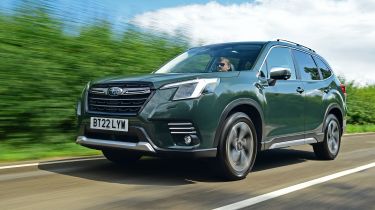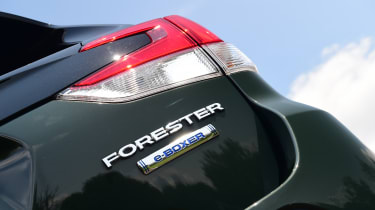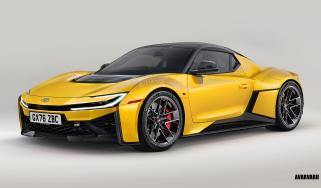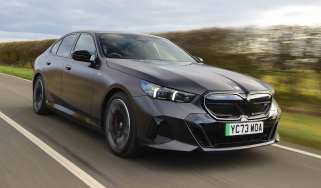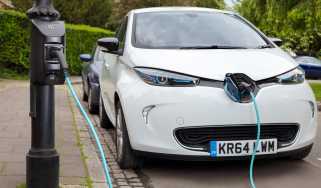New Subaru Forester 2023 review
The latest Forester is one of the most capable compact SUVs when it comes to off-roading, but it’s far from being a class-leader

Verdict
If you’re after an SUV with real off-road ability then the Forester certainly has appeal. Overall, it feels dated, however. An alternative to the norm, perhaps, but without being particularly characterful or interesting. The powertrain is rather unusual in this segment but it’s thirsty and performance is sluggish, plus the onboard technology is frustrating.
Subaru’s client base used to be split into two camps - those wanting to channel their inner Colin McRae and Richard Burns with an turbocharged Impreza and those seeking sturdy, practical off-roaders like the Legacy, Outback and Forester. It’s the Forester that we’re driving here in facelifted guise and with no Impreza to speak of (in the UK at least), Subaru’s immediate sales success will depend heavily whether its good enough to convince those utility-focused Subaru buyers.
The fifth-generation Subaru Forester went on sale here in 2019 so this mid-life refresh has arrived right on time. Subaru has focused on raising the Forester’s levels of technology to help it stand out from some tough competition which includes the Toyota RAV4, Ford Kuga, Nissan Qashqai, Mazda CX-5, Peugeot 3008, Skoda Karoq and plenty of other mid-size SUVs.
Don’t go looking for too many changes to the exterior, which, lets be honest, looks like the result of someone typing ‘generic SUV’ into an artificial intelligence image generator. There’s a slightly different radiator grille, new fog light surrounds and a selection of three new paint finishes, one of which is the suitably well camouflaged Cascade Green on our top-spec XE Premium Lineartronic test car.
More reviews
Car group tests
In-depth reviews
Road tests
- New Subaru Forester 2024 review: improved tech but sole engine lacks power
- New Subaru Forester e-Boxer 2020 review
- Subaru Forester 2.0 XT 2016 review
- New Subaru Forester diesel 2015 review
Used car tests
Unfortunately we found the keyless entry (standard on all Forester trims) to be especially temperamental, sometimes requiring several attempts to open. Once you get inside, it all looks pretty familiar to the pre-facelift car. There’s an eight-inch central touchscreen with another smaller screen on top of the dash that displays information like fuel economy, safety systems, powertrain status, temperature and climate controls.
The array of readouts is a little confusing at first, not helped by the various different fonts used. It takes a few days to get familiar with the buttons on the steering wheel and dash, not least because the dash-mounted screen is operated by two groups of buttons on the steering wheel. What is impressive, however, is the overall quality of the touchpoints and that the infotainment system, although rather simple, is pretty responsive.
Another strange decision Subaru has made is to put the lane keep assist and forward collision avoidance button overhead, next to the XE Premium Lineartronic’s panoramic roof (which is pleasingly vast). The lane keep assist will stay turned off should you turn the car off and on, although the collision avoidance system resets each time, which is a bit annoying because we found it far too intrusive - as is often the case with these systems. Subaru’s fourth-generation EyeSight driver-assistance technology also features - which reminds you to look at the road when it thinks you’re not paying attention, although we found this to be rather inconsistent.
Start the Forester up and you're met with a little grumble from deep within the engine bay. It’s a low-lying 2.0-litre four-cylinder boxer unit with 148bhp, the same unit as the old model. Subaru has, however, adapted the electric side of the powertrain to incorporate a small 16bhp electric motor, which can drive the car on electric power alone for around one mile at speeds of up to 25mph.
It’s difficult to determine how much ground you can cover on electric power alone because the ‘EV’ mode seemed to only cut-in while coasting. A feather-light touch of the throttle is needed to ensure the petrol engine doesn’t engage. Subaru claims the Forester will do a combined 34.7mpg, which is possible if you’re careful, but many of its mild-hybrid rivals will see above 40mpg.
Mated to this engine is Subaru’s ‘Lineartronic’ CVT gearbox, which we don’t especially like. Because there’s not much power available, too often it felt like we were ringing the neck of the Forester to make progress - worsened by the CVT’s habit of holding on to its virtual gears longer than needed. There is a manual mode complete with paddle shifters but in all honesty they may as well just be there for decoration given how infrequently owners are likely to use them. If you’re gentle you’ll find the transmission’s automated steps ratios to be pretty smooth.
The Forester feels like a traditional SUV on the road. You get a rather upright driving position, plenty of body roll in the corners, and some pitch and tilt under acceleration and braking. Subaru’s effort certainly not a challenger to the Ford Kuga in the dynamism department. The bluff shape also means you get a fair amount of wind noise at motorway speeds, although the powertrain does become hushed.
The old-school feel of the Forester is not without its benefits. There’s tremendous visibility thanks to the low window line, everything feels like it’s built to last and there’s plenty of handy storage cubbies dotted around the cabin. There’s enough space for adults in the back, plus heated rear seats, although the 509-litre boot is a little disappointing.
Subaru has a rich history of providing tough workhorses to farmers and the Forester has been at the forefront of this - second only to the Outback that has just been voted the most reliable 4x4 in our Driver Power customer satisfaction survey. The new Forester certainly upholds this tradition, not just because of the solid interior but also as a result of its off-road prowess.
There’s a knobbly dial on the centre console that carries the legend ‘X-Mode’. When stationary, you can select two settings - snow/dirt and deep snow/mud, which essentially changes the amount of low-down torque provided by the mild-hybrid system. Subaru’s off-road experts have also fiddled with the hill descent system and we can safely say most drivers would back out of a descent before the Forester gives up. There’s not many family SUVs this side of a Land Rover Defender that’ll be able to traverse the same challenging landscapes as the Subaru Forester.
At over £40,000 for this range-topping version the Forester is keenly priced against a slew of talented rivals - the £3,000 cheaper entry-level model is still relatively well-equipped and would be our pick of the range.
| Model: | Subaru Forester 2.0i XE Premium Lineartronic |
| Price: | £40,990 |
| Powertrain: | 2.0-litre four-cylinder boxer + hybrid motor |
| Power/torque: | 148bhp/194Nm |
| Transmission: | CVT automatic |
| 0-62mph: | 11.8 seconds |
| Top speed: | 117mph |
| Economy/efficiency: | 34.7mpg/185g/km |
| On sale: | Now |

